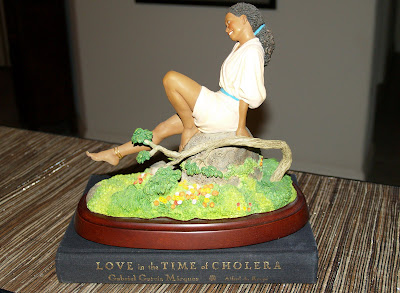As you can see by the pictures, I am blessed with a beautiful family: one faithful husband of 54 years who has watched me do many wacky things in life and shook his head in amazement as I continued along my own, not always sterling path; three successful sons who grew up with me and brought me much joy; two wonderful daughters-in-law, who call me Mom; five exceptional, witty, intelligent grandchildren; and five surviving, supportive siblings, who never got the breaks I had.
We have fun as a family and they give me lots of love but I was still struggling with many issues, especially from my childhood and being young at a time when low expectations were held for women and Blacks. I was itching to do something...didn't know what, but something. My head felt like it was exploding with pleas for an outlet.
I tried painting, after retiring, as something to do, but most of my paintings ended up stacked in my garage or in the hands of friends and family who knew I needed a pick-me-up and wanted to let me know that I was OK. Painting was an experiment in learning something new because I just like learning. The journey is what is important to me and I plan to continue learning as much as I can about painting.
One day, with nothing to do, I was surfing the web, and accidentally ran across an article about blogging. What the hell is that? I read some more and thought, "why not?" Give it a try. I stumbled, got up, and tried again. I tried blogspot and wordpress and thought that blogspot was easier. I timidly put my foot in the water, and walked out into a beautiful, welcoming pond. I knew about my life and hoped that if I poured those memories into the pond, perhaps a ripple in the water would bring me some comfort and knowledge. It's also cheaper than a therapist.
I'll never forget the feeling when I saw the first comment. What? Someone actually read what I wrote! What a thrill. Then someone else read it (or looked at my artblog) and I felt rejuvenated. I visited other blogs and began to connect with other bloggers, people, I called in my mind, blogger friends. I even visit blogs in foreign languages that I don't understand and feel connected.
So, this is my tribute, to you, my blogger friends. You and your blogs have helped me more than I can tell you. I won't call names because I will forget someone, but offer a few examples of how you helped: kudos from family members, encouragement from a teacher, a crucial perspective about my life from the Village Idiot, (that's not an insult, that's what he lists as his occupation) intellectual stimulation from someone in advertisement, and the joys of motherhood from a baker.
You have done more than you will ever know. You have erased my depression. It might be an online virtual life but if it helps me with my offline life, it has done its job. I am more at peace and grateful for your presence in my life.
Thanks, hugs, and kisses.
I am old and need to remember.
You are young and need to learn.
If I forget the words
Will you remember the music?
from Swaziland





















